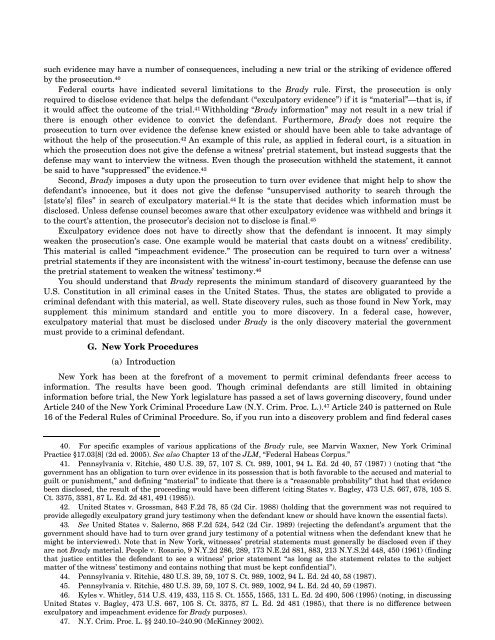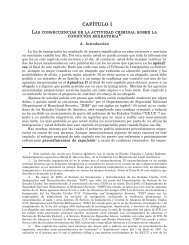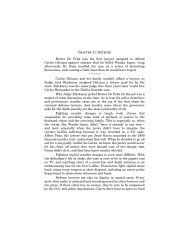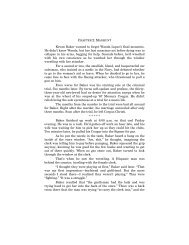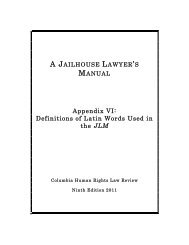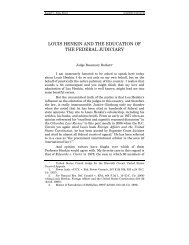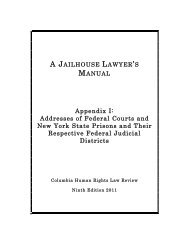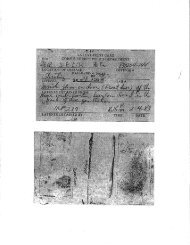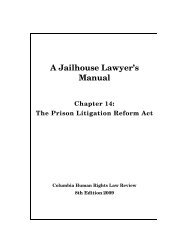A Jailhouse Lawyer's Manual - Columbia Law School
A Jailhouse Lawyer's Manual - Columbia Law School
A Jailhouse Lawyer's Manual - Columbia Law School
Create successful ePaper yourself
Turn your PDF publications into a flip-book with our unique Google optimized e-Paper software.
such evidence may have a number of consequences, including a new trial or the striking of evidence offered<br />
by the prosecution. 40<br />
Federal courts have indicated several limitations to the Brady rule. First, the prosecution is only<br />
required to disclose evidence that helps the defendant (“exculpatory evidence”) if it is “material”—that is, if<br />
it would affect the outcome of the trial. 41 Withholding “Brady information” may not result in a new trial if<br />
there is enough other evidence to convict the defendant. Furthermore, Brady does not require the<br />
prosecution to turn over evidence the defense knew existed or should have been able to take advantage of<br />
without the help of the prosecution. 42 An example of this rule, as applied in federal court, is a situation in<br />
which the prosecution does not give the defense a witness’ pretrial statement, but instead suggests that the<br />
defense may want to interview the witness. Even though the prosecution withheld the statement, it cannot<br />
be said to have “suppressed” the evidence. 43<br />
Second, Brady imposes a duty upon the prosecution to turn over evidence that might help to show the<br />
defendant’s innocence, but it does not give the defense “unsupervised authority to search through the<br />
[state’s] files” in search of exculpatory material. 44 It is the state that decides which information must be<br />
disclosed. Unless defense counsel becomes aware that other exculpatory evidence was withheld and brings it<br />
to the court’s attention, the prosecutor’s decision not to disclose is final. 45<br />
Exculpatory evidence does not have to directly show that the defendant is innocent. It may simply<br />
weaken the prosecution’s case. One example would be material that casts doubt on a witness’ credibility.<br />
This material is called “impeachment evidence.” The prosecution can be required to turn over a witness’<br />
pretrial statements if they are inconsistent with the witness’ in-court testimony, because the defense can use<br />
the pretrial statement to weaken the witness’ testimony. 46<br />
You should understand that Brady represents the minimum standard of discovery guaranteed by the<br />
U.S. Constitution in all criminal cases in the United States. Thus, the states are obligated to provide a<br />
criminal defendant with this material, as well. State discovery rules, such as those found in New York, may<br />
supplement this minimum standard and entitle you to more discovery. In a federal case, however,<br />
exculpatory material that must be disclosed under Brady is the only discovery material the government<br />
must provide to a criminal defendant.<br />
G. New York Procedures<br />
(a) Introduction<br />
New York has been at the forefront of a movement to permit criminal defendants freer access to<br />
information. The results have been good. Though criminal defendants are still limited in obtaining<br />
information before trial, the New York legislature has passed a set of laws governing discovery, found under<br />
Article 240 of the New York Criminal Procedure <strong>Law</strong> (N.Y. Crim. Proc. L.). 47 Article 240 is patterned on Rule<br />
16 of the Federal Rules of Criminal Procedure. So, if you run into a discovery problem and find federal cases<br />
40. For specific examples of various applications of the Brady rule, see Marvin Waxner, New York Criminal<br />
Practice §17.03[8] (2d ed. 2005). See also Chapter 13 of the JLM, “Federal Habeas Corpus.”<br />
41. Pennsylvania v. Ritchie, 480 U.S. 39, 57, 107 S. Ct. 989, 1001, 94 L. Ed. 2d 40, 57 (1987) ) (noting that “the<br />
government has an obligation to turn over evidence in its possession that is both favorable to the accused and material to<br />
guilt or punishment,” and defining “material” to indicate that there is a “reasonable probability” that had that evidence<br />
been disclosed, the result of the proceeding would have been different (citing States v. Bagley, 473 U.S. 667, 678, 105 S.<br />
Ct. 3375, 3381, 87 L. Ed. 2d 481, 491 (1985)).<br />
42. United States v. Grossman, 843 F.2d 78, 85 (2d Cir. 1988) (holding that the government was not required to<br />
provide allegedly exculpatory grand jury testimony when the defendant knew or should have known the essential facts).<br />
43. See United States v. Salerno, 868 F.2d 524, 542 (2d Cir. 1989) (rejecting the defendant’s argument that the<br />
government should have had to turn over grand jury testimony of a potential witness when the defendant knew that he<br />
might be interviewed). Note that in New York, witnesses’ pretrial statements must generally be disclosed even if they<br />
are not Brady material. People v. Rosario, 9 N.Y.2d 286, 289, 173 N.E.2d 881, 883, 213 N.Y.S.2d 448, 450 (1961) (finding<br />
that justice entitles the defendant to see a witness’ prior statement “as long as the statement relates to the subject<br />
matter of the witness’ testimony and contains nothing that must be kept confidential”).<br />
44. Pennsylvania v. Ritchie, 480 U.S. 39, 59, 107 S. Ct. 989, 1002, 94 L. Ed. 2d 40, 58 (1987).<br />
45. Pennsylvania v. Ritchie, 480 U.S. 39, 59, 107 S. Ct. 989, 1002, 94 L. Ed. 2d 40, 59 (1987).<br />
46. Kyles v. Whitley, 514 U.S. 419, 433, 115 S. Ct. 1555, 1565, 131 L. Ed. 2d 490, 506 (1995) (noting, in discussing<br />
United States v. Bagley, 473 U.S. 667, 105 S. Ct. 3375, 87 L. Ed. 2d 481 (1985), that there is no difference between<br />
exculpatory and impeachment evidence for Brady purposes).<br />
47. N.Y. Crim. Proc. L. §§ 240.10–240.90 (McKinney 2002).


